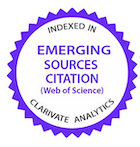Frangos desafiados experimentalmente com salmonella enterica sorovar enteritidis e eimeria tenella e tratados com ácidos orgânicos
DOI:
https://doi.org/10.1590/1809-6891v20e-43084Resumo
Foi avaliado um composto comercial de ácidos orgânicos, adicionado à ração, no controle da Salmonella de frangos de corte desafiados com Salmonella Enteritidis e Salmonella Enteritidis associadas à Eimeria tenella. Foram utilizados 504 pintos de um dia, fêmeas, da linhagem Hubbard®, sendo o delineamento inteiramente casualizado em esquema fatorial 2x3, totalizando seis tratamentos com seis repetições e 14 aves a unidade experimental. Foi analisado o pH intestinal, o escore de lesão dos cecos, contagem de oocistos fecais e a presença de salmonela no baço e tonsilas cecais das aves. Aves desafiadas com S. Enteritidis que receberam ácidos apresentaram menor frequência de isolamento da bactéria nos órgãos linfoides analisados. Assim como apresentaram redução no número de oocistos de E. tenella nas excretas coletadas diretamente na bandeja e redução dos escores de lesão intestinal provocadas pela infecção por Eimeria tenella. Os ácidos orgânicos promoveram benefício à saúde intestinal dos frangos de corte com reflexos positivos no controle da Salmonella Enteritidis juntamente com a Eimeria tenella.
Palavras-chave: coccidiose, intestino delgado, microbiologia
Downloads
Publicado
Como Citar
Edição
Seção
Licença
Copyright (c) 2019 Ciência Animal Brasileira

Este trabalho está licenciado sob uma licença Creative Commons Attribution 4.0 International License.
Autores que publicam nesta revista concordam com os seguintes termos:
- Autores mantém os direitos autorais e concedem à revista o direito de primeira publicação, com o trabalho simultaneamente licenciado sob a Licença Creative Commons Attribution que permite o compartilhamento do trabalho com reconhecimento da autoria e publicação inicial nesta revista.
- Autores têm autorização para assumir contratos adicionais separadamente, para distribuição não-exclusiva da versão do trabalho publicada nesta revista (ex.: publicar em repositório institucional ou como capítulo de livro), com reconhecimento de autoria e publicação inicial nesta revista.
- Autores têm permissão e são estimulados a publicar e distribuir seu trabalho online (ex.: em repositórios institucionais ou na sua página pessoal) a qualquer ponto antes ou durante o processo editorial, já que isso pode gerar alterações produtivas, bem como aumentar o impacto e a citação do trabalho publicado (Veja O Efeito do Acesso Livre).






























